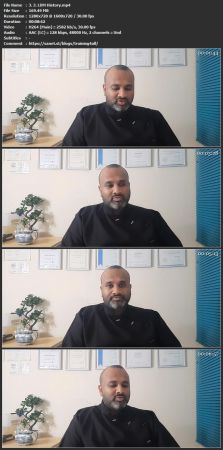|
Lymphatic Drainage Massage Diploma Course

https://TutPig.com
Last Update: 11/2021
Duration: 1h 27m | Video: .MP4, 1280x720 30 fps | Audio: AAC, 44.1 kHz, 2ch | Size: 1.7 GB
Genre: eLearning | Language: English
Complete Lymphatic Drainage Massage Diploma Course
What you'll learn:
1. LDM Introduction
2. Vodder technique
3. LDM History
4. Idm contraindications
5. Lymphedema
6. The Lymphatic system
7. LDM
8. Casley-smith LDM
9. LDM Primary effects
10. Leduc Technique
11. How to perform LDM
12. Self LDM
13. LDM calfs & hamstring
14. LDM lower back & scapula
15. LDM knee & quads
16. LDM tummy & chest
17. LDM head neck shoulders
18. Congrats
Requirements:
muscle, tension, stimulation, flexibility, heightened, alertness, reduced, anxiety
Description:
The lymphatic system is a vital part of the immune system. It includes organs such as the thymus, bone marrow, spleen, tonsils, appendix, and Peyer patches in the small intestine that produce and process specialized white blood cells that fight infection and cancer.
Like the venous system, the lymphatic system transports fluids throughout the body. The lymphatic system consists of
Thin-walled lymphatic vessels
Lymph nodes
Two collecting ducts
Lymphatic vessels, located throughout the body, are larger than capillaries (the smallest blood vessels, which connect arteries and veins), and most are smaller than the smallest veins. Most of the lymphatic vessels have valves like those in veins to keep the lymph, which can clot, flowing in the one direction (toward the heart). Lymphatic vessels drain fluid called lymph from tissues throughout the body and return the fluid to the venous system through two collecting ducts.
Lymph begins as fluid that has diffused through the very thin walls of capillaries into the space between cells. Most of the fluid is reabsorbed into the capillaries and the rest is drained into the lymphatic vessels, which eventually return it to the veins. Lymph also contains many other substances including
Proteins, minerals, nutrients, and other substances, which provide nourishment to tissues
Damaged cells, cancer cells, and foreign particles (such as bacteria and viruses) that may have entered the tissue fluids
Lymph nodes are tiny bean-shaped organs that serve as collection centers for lymph. All lymph passes through strategically placed lymph nodes, which filter damaged cells, cancer cells, and foreign particles out of the lymph. Lymph nodes also contain specialized white blood cells (for example, lymphocytes and macrophages) designed to engulf and destroy damaged cells, cancer cells, infectious organisms, and foreign particles. Thus, important functions of the lymphatic system are to remove damaged cells from the body and to provide protection against the spread of infection and cancer. Some lymph nodes are clustered under the skin, particularly in the neck, armpits, and groin. Other lymph nodes are deep within the body, for example inside the abdomen.
The lymphatic vessels drain into collecting ducts, which empty their contents into the two subclavian veins, located under the collarbones. These veins join to form the superior vena cava, the large vein that drains blood from the upper body into the heart. |
|
udp://tracker.torrent.eu.org:451/announce udp://tracker.tiny-vps.com:6969/announce http://tracker.foreverpirates.co:80/announce udp://tracker.cyberia.is:6969/announce udp://exodus.desync.com:6969/announce udp://explodie.org:6969/announce udp://tracker.opentrackr.org:1337/announce udp://9.rarbg.to:2780/announce udp://tracker.internetwarriors.net:1337/announce udp://ipv4.tracker.harry.lu:80/announce udp://open.stealth.si:80/announce udp://9.rarbg.to:2900/announce udp://9.rarbg.me:2720/announce udp://opentor.org:2710/announce |

